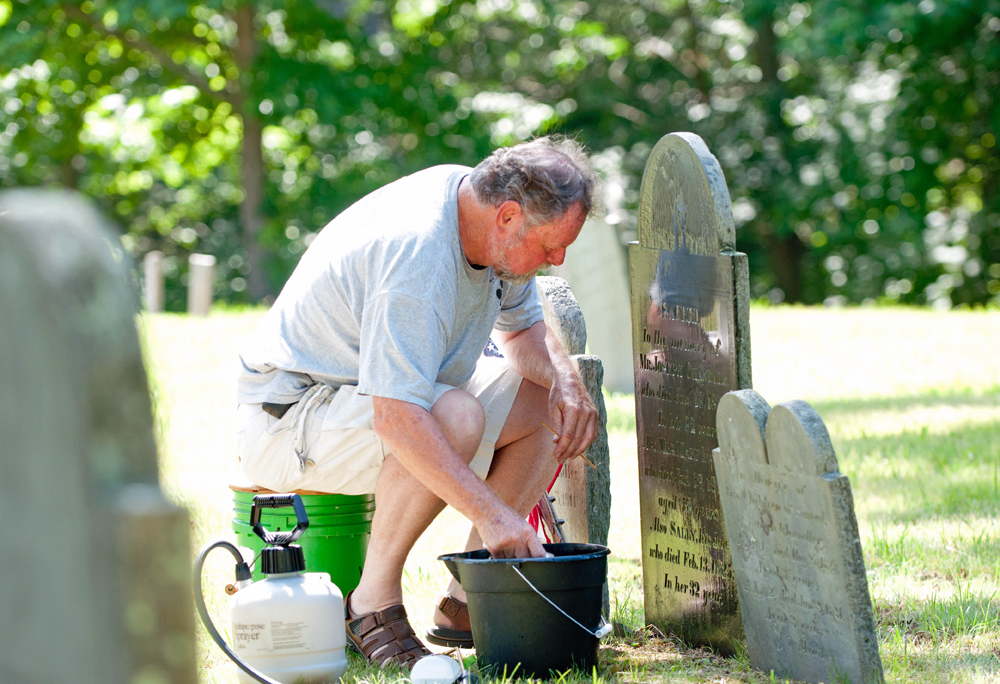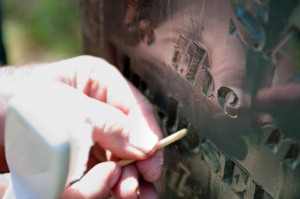True Tales from Canton’s Past: A Clean Slate
By George T. Comeau
Johnny Jorgensen sits patiently scrubbing the graves at the Canton Corner Cemetery. (Photo by the author)
On a very hot July morning, Johnny Jorgensen gets up early and fills the back of his Chevy S10 pickup truck with pails, scrub brushes, and a large plastic pump bottle filled with water. Heading up Washington Street toward Ponkapoag, Jorgy, as everyone around town knows him, realizes that he has probably been in every old house in Canton at one time or another. Being part of a community for 54 years has given Jorgy a keen sense of place and a commitment to his town.
His mother, Jean Jorgensen, had moved to Canton in 1959 from Hyde Park, where she was a single mom raising three rambunctious boys. The occasion of the move to Canton was simply to be closer to her father, Vincent Misiewicz, who had immigrated to America from Kiev, Russia. Incidentally, Jean’s father had just died, and to “be closer” meant closer to his grave at Knollwood Memorial Cemetery. Pulling all her resources together, she bought a home on Revere Court, which is still in the family today. The small 12-room duplex cost her about $3,200 at the time. Jorgy knows how hard his mom’s life was. “She never took a vacation and worked tirelessly to raise our family,” he said.
There is probably no one in Canton who knows more about what runs under the streets of this town than Jorgy. Attending the Canton Public Schools and graduating in 1966, Jorgy took a job soon after graduation with Dawson Engineering on Jackson Street. One day a family friend came in and told him about a “town job” driving a truck. Jean Jorgenson knew that folks who worked for the town had jobs for life if they worked hard and had commitment. With his mom’s urging, Jorgy soon found himself driving a Mack B-42 patch truck around the streets of Canton as part of the Department of Public Works.
It is not a glamorous job, but working in the DPW is the bread and butter of what makes a community successful and safe. Jorgy knows the exact dates that mark his career: “I started working for the town of Canton on December 5, 1967, and I worked for 44 years straight.” Which is not quite true, actually, as Jorgy served the Army from March 10, 1967, through March 11, 1971. “I had orders to go to Germany where I was a tank commander on the border between East Germany,” he recalled. “My wife, Anne, was with me, and my daughter Lori was born there.”
When he got out of his military service, his job was waiting back in Canton, and the sergeant who had commanded tanks was back in the old Mack trucks rattling around back roads of York Street. Along the way it has been a remarkable life, made so with tremendous friends. And when you hear Jorgy talk it is like something out of a comic book. He rattles his friends off by name: “There was Dinty and Bing Callahan, whose father — we called him Uncle Jim Callahan — ran the water department. I think his dad was one of the original water commissioners.” The crazy nicknames continue: “Monkey Murphy who used to drive a horse and buggy honeysuck truck for septic cleanouts, his shirt stained with tobacco juice.” Jorgy continues to rattle off more old buddies: Slip Hannon, Oinky and Bozo Kelleher and Snooter Pavadore. But he was always known as Jorgy. “Not much of a nickname, but it works,” he says.
If you drive by the Jorgensen home on Sherman Street you will find a tidy yard, weed free, and a perfectly manicured lawn. In the back is a large garage with a second story loft. Climbing the steep stairs to the loft gains you access to Jorgy’s museum of Canton — self-described “crap” that he has collected from digging up the town across four decades of service. “Dinty Callahan and I used to make extra money working overtime on Saturdays cleaning brooks and widening waterways. Over the years we dredged up all sorts of stuff — old bottles, ice tools, glass insulators, license plates and brass hose nozzles,” says Jorgy. “There is not an old house in this town in which I have not stepped foot. Working as a meter reader, we walked the entire town and went inside just about every basement there is.”
The pickup truck turns into the gates of the Canton Corner Cemetery, a place that Jorgy has spent innumerable hours over the years. “I used to dig graves in here,” he said as he pointed down the hill toward “Fenway.” The newest section of Canton Corner is named after America’s most famous ball field simply due to the fact that when Haywood Sullivan lived in Canton and was a general partner in the Boston Red Sox, he made a deal with the superintendent of public works, Donald Podgurski, for the outfield sod to be given to the town. The sod was laid on the newest section of the cemetery, and insiders refer to that area simply as “Fenway.”
Heading up the hill to the oldest section of the burying ground, Jorgy swings his truck wide and parks under the shade of an ancient maple tree. A clipboard in hand, his tanned face smiles as he sets up his tools. The tools are simple: a soft brush, a plastic putty knife, a few bamboo skewers — the kind used for making kabobs — and his buckets of water. Kneeling down, his hands graze across the slate headstone and he feels the green mold that has grown up, covering the names and dates of the dead. “Most of what I do is pure elbow grease,” said Jorgy, who is helping the Canton Historical Commission clean ancient gravestones. Trained by preservation professionals, this man spends seven hours a day just cleaning the stones of our ancestors.

The details come to life as Jorgy slowly clears out hundreds of years of dirt and grime. (Photo by the author)
Jorgy retired three years ago, and he says simply, “I’m retired. I got as high as curbstone. If my family is happy, I’m happy.” In retirement there are so many folks who turn their attention to long neglected hobbies or rounds of golf. But within Jorgy’s retirement is a renewed commitment to simply being outside and helping Canton. The work he is doing today is restoring our history and keeping good on a sacred, moral commitment to the dead. “I took my wife up there the other day to show her the stone I spent an hour cleaning,” he said. “It looks perfect today. It came out awesome. The lettering was amazing. When you see the borders on these stones, you just marvel at the workmanship of the carvings. The guy who cut these stones must have started when the dead guy was an infant — this is amazing work.”
Jorgy is inspired by the artwork on the centuries-old stones. Grabbing a water bottle, he spritzes the grey slate and the engravings literally come alive. The water illuminates delicate flowers, urns, leaves, and sunrise patterns. “I love peace and quiet,” he said, “and the cemetery is the most quiet place I know. I bring a sandwich and just work through the day.”
Jorgy has made so many commitments to his dying friends that each year he spends days polishing and tending to graves. “When my brother died, he said I do not want be forgotten,” so it has fallen to Jorgy to make good on his promises. “Walter Landon, Buddy Brown, Eddie Roache, Georgie Roache, guys I have known,” he said, “I oil their bronze plaques at Knollwood. I am a cemetery person.”
And then there is the devilish side of tending to the graves of his friends. “I knew Billy Correia since 1959,” said Jorgy. “He was my oldest and best friend; for years we plowed snow together.” Jorgy tells of how Billy hated the snow with a passion, and yet on June 16 Jorgy went to the town rink and picked up a few pails of snow, drove to Canton Corner and dumped the snow on Billy’s grave. “I guess it was my way of smiling down on my buddy,” he said. “I had a beer with him and a Twinkie — he loved Twinkies — and just remembered the good times we had.”
That same guy who loves being in cemeteries has now turned his time and talents to taking care of strangers’ graves. “I think about all these markers and they remind me of the streets of Canton,” he says. Names like Chapman, Hartwell, Bailey, Withington — all streets that Jorgy has either plowed, paved or fixed over the years. Now retired, this humble man slowly picks away the dirt and moss on James Tucker’s grave. With patience and a measured eye, Jorgy works the bamboo skewer deep into the letters carved in another time and place; flecks of moss and mildew fall to the ground. Tucker died in 1827, but today someone still cares enough to tend to his stone so that future generations can stop by and know he lived in Canton.
For Johnny Jorgensen, death is not really something he contemplates. “I really do not think much about it, but I do enjoy the peace and quiet here,” he says, as he quietly scrubs another grave.
Short URL: https://www.thecantoncitizen.com/?p=21485










